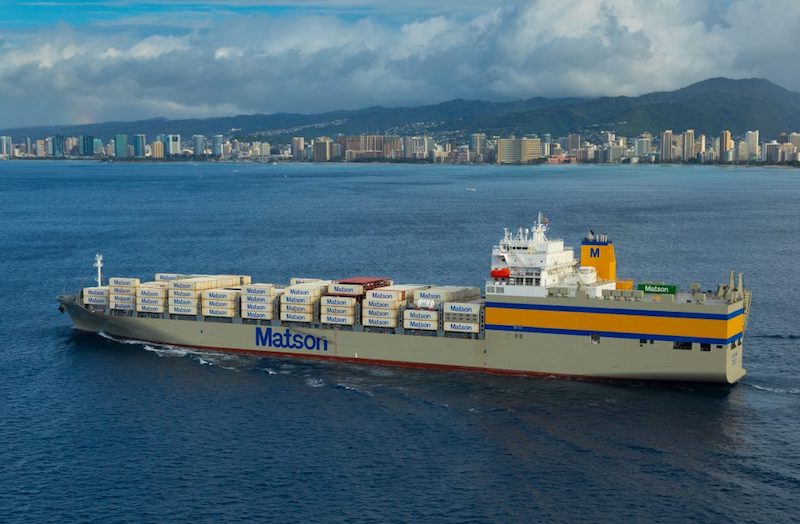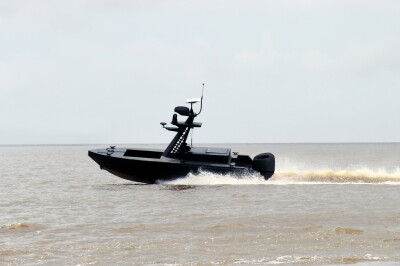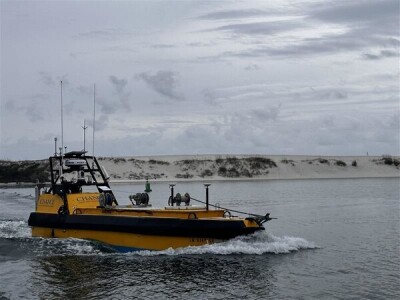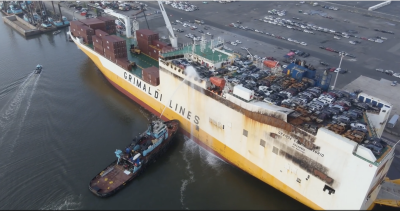Economists from Boston-based Reeve & Associates and Hawaii-based TZ Economics have released a joint report that concluded that the Jones Act has no significant impact on the cost of living in Hawaii.
The report, "The Impact of the Jones Act on Hawaii” released today by the American Maritime Partnership (AMP), found that freight rates in the U.S.-Hawaii trade lane have declined in real terms over the last 10 years, while the Jones Act has delivered positive and substantial economic contributions. This includes job creation, new infrastructure investments, and a reliable pipeline for critical consumer and industrial goods moving to and from the Islands.
A number of recent studies and articles have questioned the value of the Jones Act to Hawaii. Their claims of negative impact are not supported by the facts and ignore the examples of the positive role of the Jones Act, AMP said. In response, Reeve and TZ produced a fact-based analysis of recent developments in the U.S.-Hawaii liner shipping market in order to determine how and to what extent shipping services provided in that market impact the people and economy of Hawaii, AMP said.
In the report, economists analyzed the economic impact of the Jones Act and conducted a market-based study to consider the impact of the law to the cost of goods. Moreover, the report analyzed the effect on consumers by evaluating the competitiveness of freight rates in the U.S.-Hawaii market, the quality of service provided by the Jones Act carriers, and the impact of the carriers’ freight rates, relative to the prices of goods shipped between the U.S. and Hawaii.
“There has been a lot of contention regarding whether the Jones Act negatively affects Hawaii’s cost of living,” said John Reeve, principal at Reeve & Associates and the lead economist on the study. “The findings of our study indicate that the Jones Act has no appreciable impact on Hawaii’s cost of living, and that Jones Act carriers provide immense benefits to consumers and business owners, while delivering reliable, high frequency and fast transit services at healthy and competitive rates.”
“Our findings based on various indicators show that higher living costs — partly the premium assigned to the desirability of living in Hawaii — reflect housing costs, not the cost of consumer products relative to the U.S. mainland,” said Paul Brewbaker, principal of TZ Economics.
“The findings of this exhaustive study regarding the economic impact of Jones Act-related transportation costs in Hawaii are clear -- the Jones Act does not drive up the cost of living in Hawaii. American shipping companies operating under the Jones Act provide an efficient and reliable pipeline for consumer and industrial goods moving to and from the Islands,” said Mike Roberts, AMP president. “Waiving the Jones Act would replace American mariners and ships with foreign ships and mariners, threaten Hawaii’s supply chain, and degrade Hawaii’s and our nation’s security - yet produce no cost of living benefit to Hawaii residents.”
This report is a follow-on in a series of studies being conducted by Reeve and its partners that analyzes the comparative cost of goods in non-contiguous territories of the U.S. and the U.S. mainland, and the impact, if any, of the Jones Act.
The report's findings include:
The Jones Act does not impact the cost of living in Hawaii.
A market basket study of 200 consumer goods purchased from major retailers such as Costco, Home Depot, Target and Walmart found no significant difference in the price of consumer goods — 142 out of 200 items (71%) were exactly the same in stores in Hawaii as they were in California. In some cases, retail prices of goods were cheaper in Hawaii.
While Hawaii does have a high cost of living, that cost is primarily driven by housing expenses and other factors, not the type of consumer goods carried to Hawaii by Jones Act carriers.
Over a 10-year period, Jones Act carriers’ rates have declined in real terms for essential ocean shipping.
Freight rates in the mainland-Hawaii trade have declined in real terms when considering the cost of inflation, while benchmarks such as overall U.S. inflation and intercity truckload prices have increased substantially (28%). This freight rate decline is despite a 50% increase in wharfage charges for port/terminal improvements.
The large majority of the expenses of moving cargo between the U.S. mainland and Hawaii are completely unaffected by the Jones Act. If foreign-flag carriers were allowed to operate in the domestic trades, the costs of any foreign-flag vessel would rise substantially due to required compliance with other U.S. laws, including tax and labor laws.
The study found that only a third of the total costs of a Jones Act carrier moving freight between the mainland and Hawaii are affected by the Jones Act (crew and vessel capital costs). If the Jones Act was to be waived for Hawaii, the costs of any foreign-flag vessel operated in that U.S. domestic trade would rise substantially as it would have to comply with U.S. tax, labor, and employee protection laws apart from the Jones Act that would virtually negate any cost advantage provided by foreign registry.
Jones Act carriers are dedicated to Hawaii’s specific needs for high frequency and fast transit to deliver consumer goods to the Hawaiian Islands. Eliminating the Jones Act could undermine priority, frequency, and speed.
Three U.S.-flagged carriers with a fleet of 20 combined vessels specifically designed to accommodate the needs of Hawaii transportation commerce, currently provide regular scheduled shipping services between the U.S. mainland and Hawaii.
Due to intense and healthy competition, freight rates have declined in real terms while carriers have increased capacity with modern, custom-designed vessels.
Jones Act carriers have introduced five new U.S. vessels with three more on the way in the fourth quarter of 2020. According to the study, with these most recent additions, there is more than ample capacity to meet the needs of Hawaii families and businesses. In fact, Jones Act carriers have increased capacity by 22% since 2015 with the addition of new vessels. The level of available capacity in the market naturally drives healthy price competition.
U.S. shipping companies are invested in Hawaii, providing over $2 billion in transportation technology customized for the Hawaii market, such as new ships, terminals and equipment.
These new vessels are highly fuel-efficient, environmentally friendly and contribute to reduced sulfur emissions. Hawaii residents also benefit from improvements to terminals, including the addition of new infrastructure such as gantry cranes.
Jones Act carriers play a critical role in support of U.S. national security, while meeting the needs of military personnel and their families who comprise nearly 10% of Hawaii’s population.
Jones Act carriers provide a reserve force of well-trained seafarers who in times of national emergency can crew reserve sealift vessels, while ensuring the U.S. does not need to rely on foreign carriers to move people and military assets.
Around 9.6% of Hawaii’s population is U.S. military personnel and their families. Jones Act carriers ship a high proportion of personal effects (vehicles and household goods) that are needed for those families.
The Jones Act industry supports 13,000 jobs for Hawaii families.
The Jones Act delivers $787 million in annual workforce income and $3.3 billion economic impact to the local economy.





